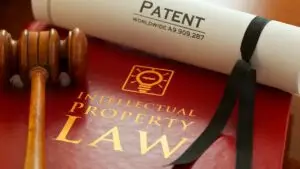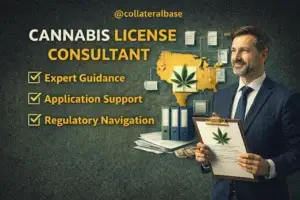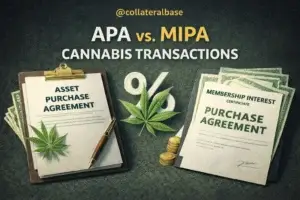Protecting your intellectual property in the cannabis industry is vital, and a cannabis IP licensing agreement can help you achieve this. In this blog post, we’ll explore the different types of agreements available and provide tips on negotiating fair terms and conditions with licensees. Read on to learn how to protect your valuable trademarks, patents, and trade secrets in the ever-growing world of cannabis business.
What is a Cannabis IP Licensing Agreement?
 An IP licensing agreement is a legal contract between two parties, where one party (the licensor) grants permission to the other party (the licensee) to use their intellectual property. This includes patents, trademarks, copyrights and trade secrets. The licensee pays a fee or royalty for this right of usage.
An IP licensing agreement is a legal contract between two parties, where one party (the licensor) grants permission to the other party (the licensee) to use their intellectual property. This includes patents, trademarks, copyrights and trade secrets. The licensee pays a fee or royalty for this right of usage.
In the cannabis industry, an IP licensing agreement can be particularly important as it provides businesses with protection for their proprietary strains, products and technology. It is crucial that cannabis businesses protect their intellectual property in order to safeguard against infringement by competitors and ensure ongoing revenue streams from licensed product sales. Some common forms of intellectual property that can be licensed in the cannabis industry include strains of marijuana plants, extraction methods and branded products such as edibles or concentrates.
Types of Cannabis IP Licensing Agreements
Exclusive licensing agreements give the licensee exclusive rights to use the licensor’s IP, while non-exclusive licenses allow other companies to use it too. Sublicensing agreements let a licensee sublicense the licenser’s IP to generate more revenue. Consider carefully which type of agreement will work best for your company and negotiate all terms and conditions in writing before signing any contract. Protecting intellectual property is critical in the cannabis industry, so take time to ensure you choose a suitable brand protection strategy such as licensing agreements with all necessary legal documentation in place.
Exclusive licensing agreements
An exclusive licensing agreement is a legal contract that allows the licensee to have sole rights to use the licensor’s intellectual property (IP). In the cannabis industry, an exclusive licensing agreement can be critical for protecting valuable IP. However, it is important to consider potential drawbacks as well.
Benefits of an Exclusive Licensing Agreement in the Cannabis Industry:
- Provides exclusive rights and protection of IP
- Allows companies to build their brand and reputation
- Can generate revenue through licensing fees
Potential Drawbacks of an Exclusive Licensing Agreement:
- Limits opportunities for growth or expansion
- May require significant investment from both parties upfront
- May limit innovation by restricting others from using similar technology or processes
Non-exclusive licensing agreements
Non-exclusive licensing agreements allow the licensee to use the licensor’s IP, but not exclusively. These agreements can be beneficial for both parties in the cannabis industry, as it allows for flexibility and collaboration. For IP owners, non-exclusive agreements provide a wider range of potential licensees, which can increase revenue opportunities and brand exposure. Licensees benefit by gaining access to valuable intellectual property without having to shoulder all of the costs associated with exclusive licensing agreements.
Successful non-exclusive deals in the cannabis industry include collaborations between growers and product manufacturers or distributors who want to use their brand name on specific products. Another example is when research institutions partner with private companies that license their technology on a non-exclusive basis; this allows them better funding without sacrificing control over their work or limiting future commercialization options. Ultimately, whether an agreement should be exclusive or non-exclusive depends on critical factors such as market demand, competition levels within niche markets like CBD oils versus edibles etc., long-term business goals (like entering new markets), pricing strategies based around current market trends while considering how future growth might affect things down-the-road!
Sublicensing agreements
Sublicensing arrangements are a critical aspect of any cannabis IP licensing agreement. This type of agreement allows the licensee to sublicense the licensor’s intellectual property to third parties, thereby expanding its reach and generating more revenue. However, it is essential to consider both pros and cons associated with sublicensing from both perspectives (licensor and licensee) before entering into such an arrangement. When drafting sublicensing provisions into a wider intellectual property contract, key considerations include:
- Clear identification of the rights being licensed
- Appropriate limitations on sublicensing activities
- Right to terminate or modify sublicense agreements by either party
- Mechanisms for monitoring quality control standards
By carefully considering all aspects of sub-license arrangements in cannabis industry contracts upfront, companies can better protect their brand equity while building productive business partnerships that boost overall success.
Terms and Conditions of Cannabis IP Licensing Agreements
Key terms and conditions included in typical cannabis IP licensing agreements are exclusivity, territory, duration of the agreement, payment structure, and ownership of improvements. It’s crucial to define the scope and limitations of use for licensed IPs to avoid any disputes regarding infringement or misuse. This includes specifying the permitted use case scenarios as well as activities that are prohibited.
When drafting a license agreement for cannabis IP, it’s essential to include termination clauses that cater to both parties’ interests. The licensee may want an option to terminate if they aren’t generating enough revenue within a certain period while still maintaining access rights until their obligations end. At the same time, licensors should have provisions safeguarding their intellectual property in case of non-compliance or breach by the licensee.
Overall, having a thorough understanding of these key terms and conditions with carefully crafted provisions is fundamental when entering into a cannabis IP licensing agreement. Protecting your intellectual property is critical in today’s competitive business landscape amidst constantly changing laws affecting the industry.
Negotiating a Fair Cannabis IP Licensing Agreement
When negotiating a fair cannabis IP licensing agreement, there are several tips for achieving mutually beneficial terms with licensors or licensees. First and foremost, it is crucial to understand the value of your intellectual property in the market and its potential profitability. This can help you negotiate appropriate royalty or fee amounts for its use.
It is also important to strike a balance between exclusive versus non-exclusive licenses. While exclusivity may provide more control over how your IP is used, it can limit potential revenue streams from other partnerships. Non-exclusive agreements allow for wider distribution but may require more careful monitoring of usage by multiple parties to prevent infringement. By carefully considering these factors during negotiations, both parties can achieve a fair deal that protects their interests while promoting growth in the industry as a whole.
What are the steps involved in negotiating a cannabis IP licensing agreement?
Negotiating a cannabis IP licensing agreement involves several important steps to ensure that both parties are protected and that the agreement is fair. Here are the key steps involved in negotiating a cannabis IP licensing agreement:
1. Identify your IP: Before entering into any licensing agreement, it is crucial to clearly identify and define the specific intellectual property that you want to license. This can include trademarks, patents, trade secrets, or any other valuable IP assets that you own.
2. Determine your licensing objectives: Clearly define your goals and objectives for the licensing agreement. Consider factors such as the scope of the license, geographical limitations, and the duration of the agreement. Determine whether you want an exclusive or non-exclusive license and whether sublicensing will be allowed.
3. Conduct due diligence: Before entering into any agreement, it is important to conduct thorough due diligence on the potential licensee. This includes researching their reputation, financial stability, and their ability to fulfill their obligations under the agreement. It is also important to assess whether the licensee has the necessary resources and expertise to effectively utilize your IP.
4. Determine financial terms: Negotiate the financial terms of the agreement, such as royalty rates or upfront fees. Consider factors such as the value and uniqueness of your IP, market conditions, and the anticipated revenue generated from the licensed IP. It is important to strike a balance between fair compensation for the licensor and a reasonable financial burden for the licensee.
5. Draft the agreement: Once the key terms and conditions have been negotiated,the next step is to draft the licensing agreement. It is recommended to seek legal assistance from a knowledgeable attorney who specializes in intellectual property law. The agreement should clearly outline the rights and obligations of both parties, including the scope of the license, any restrictions or limitations, and the duration of the agreement. It should also include provisions for dispute resolution and termination.
6. Review and revision: Review the draft agreement carefully to ensure accuracy and clarity. Make any necessary revisions or amendments to address any concerns or issues that may have arisen during the negotiation process. It is essential for both parties to fully understand and agree to the terms of the agreement before signing.
7. Execution and enforcement: Once both parties are satisfied with the final agreement, it can be executed by signing and exchanging copies. It is important to keep thorough records of the executed agreement for future reference. Both parties should also establish a system for monitoring and enforcing the terms of the agreement to prevent any potential infringement or breach.
In summary, negotiating a cannabis IP licensing agreement requires careful consideration of the specific intellectual property involved, clear objectives, thorough due diligence, fair financial terms, and a well-drafted agreement. By following these steps and seeking legal guidance, both licensors and licensees can protect their interests and contribute to the growth and success of the cannabis industry.
What is the duration of a typical cannabis IP licensing agreement?
The duration of a typical cannabis IP licensing agreement can vary depending on the specific terms negotiated between the licensor and licensee. Generally, the duration can range from a few years to several decades. It is important for both parties to carefully consider the length of the agreement and any potential renewal or termination clauses. Additionally, the duration may also be influenced by factors such as the nature of the IP being licensed, the industry standards, and the specific goals and objectives of the parties involved. It is advisable to consult with legal professionals experienced in intellectual property and cannabis law to determine the most appropriate duration for a specific cannabis IP licensing agreement.
What remedies are available for breach of a cannabis IP licensing agreement?
In the event of a breach of a cannabis IP licensing agreement, there are several remedies that may be available. These remedies can help the aggrieved party protect their intellectual property and seek compensation for any damages suffered. Here are some common remedies for breach of a cannabis IP licensing agreement:
1. Injunctive Relief: This is a court order that restrains the breaching party from further use of the licensed IP. It is intended to prevent ongoing infringement and can be granted before or during litigation. Injunctive relief is often sought to preserve the value and integrity of the licensed IP.
2. Damages: The non-breaching party may seek monetary damages to compensate for any losses incurred due to the breach. These damages can include both actual damages (such as lost profits) and consequential damages (such as harm to reputation or brand value). The damages awarded will depend on the specific circumstances of the breach and may be subject to limitations outlined in the licensing agreement.
3. Specific Performance: In some cases, the non-breaching party may seek specific performance, which requires the breaching party to fulfill their obligations under the licensing agreement. This remedy is typically sought when monetary compensation alone is not sufficient to remedy the harm caused by the breach.
4. Termination of Agreement: If the breach is significant and irreparable, the non-breaching party may have the right to terminate the licensing agreement. This would effectively end the licensee’s right to use the licensed IP and may also include the return of any materials or assets related to the IP.
5. Attorney’s Fees and Costs: Depending on the terms of the licensing agreement, the prevailing party in a breach of contract lawsuit may be entitled to recover their attorney’s fees and costs incurred in pursuing the legal action. This can help offset the financial burden of litigation for the aggrieved party.
It is important to note that the availability and extent of these remedies may vary depending on the jurisdiction and the specific provisions in the licensing agreement. It is advisable to consult with legal professionals experienced in intellectual property and cannabis law to understand the remedies available in your jurisdiction and to draft a comprehensive licensing agreement that adequately protects your rights.
Conclusion:
Protecting your intellectual property in the cannabis industry is crucial for maintaining a competitive edge and preserving the value of your brand. A cannabis IP licensing agreement can be a powerful tool in safeguarding your trademarks, patents, and trade secrets. By choosing the right type of licensing agreement, negotiating fair terms and conditions, and seeking legal remedies in case of a breach, you can effectively protect your intellectual property and ensure its long-term success in the cannabis industry.





